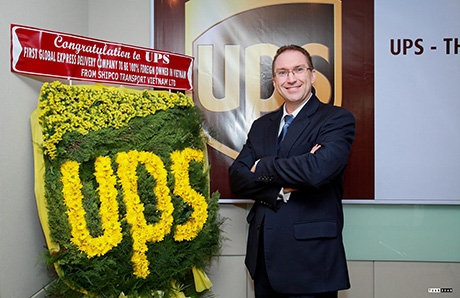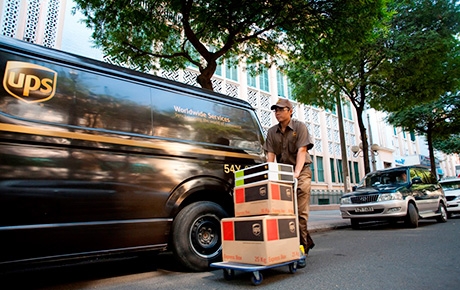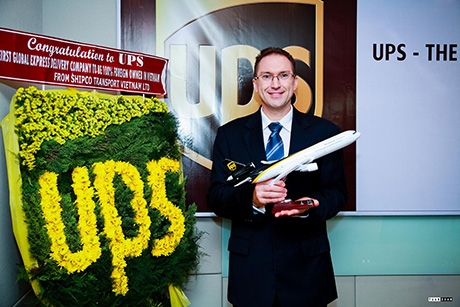UPS becomes the first 100 per cent foreign owned express company in Vietnam
UPS Vietnam country manager Jeff McLean talked to VIR about the company’s strategy in a new chapter.

Why UPS decide to become 100 per cent foreign ownership company in Vietnam?
Vietnam market is a very positive market and an important country in the global UPS network. We started to do survey about the market since 1990s and the end of the year 1994 we decided to start a joint stock company with a local partner. For the long term, Vietnam is a favourable market when joining World Trade Organisation (WTO).
With such positive impression, we started our company here to hand out the direct investment in Vietnam and set up the joint stock company with the local partner with the view of having 100 per cent foreign ownership when WTO regulation is allowed in the year of 2012 and now we did it.
Against the backdrop of the global financial crisis, it’s difficult for us to find out many good markets like Vietnam. Today, the Vietnamese economy continues to be relatively strong. Last year, the GDP spent a six per cent.

How can enterprise customer take advantages from this opportunity of UPS Vietnam?
Being 100 per cent owned gives us greater control and freedom over how we invest in the country so that we can help Vietnam businesses grow beyond Vietnam and export their products into neighbouring countries and even to Europe and the US.
For example, we will strongly bring the global technology to the customer in Vietnam and continuously open locations to expand our facilities as we continue to invest in the market.
Currently, we have facilities in key commercial and industrial centers across Vietnam including Ba Ria-Vung Tau, Binh Duong, Hai Duong and Bac Ninh provinces.
We also grew our employees from 25 before May 2010 to more than 270 today. We invested in our delivery fleet and today we have over 80 vans, trucks and motorcycles.
In the future, we will continue to invest and grow our business in Vietnam according to the needs of our customers.
Besides that, our customers in Vietnam will benefit from the $1 billion UPS invest in technology worldwide while Vietnam is more and more important market of UPS. With UPS, they experience reliability, and they know where their package is throughout the shipping because of our advanced tracking systems.
One example is that we are upgrading our hand-held technology in Vietnam with device namely Diad. This is the fifth generation of our hand-held device which can scan the barcode on the package when we come to your company to pick up the package. When we close that package for export and fly to another country and deliver it to our customer’s customer, the receiver will able to see the progress of the delivering of the package via the internet.
This is the front-end device. As a customer, you have to have a several tools that the data of the device will be written in global system. What customer can do is to set up its account to automatically receive an email and send its customer an email.
If our customer is sending one to two packages everyday, an email is good. If it is sending 20 or 50 packages everyday, it may not need an email but a short consolidate report at the end of the day.
All what we are doing is to become pioneer in bringing global trade services to our customers in Vietnam.

And what will UPS help small and medium-sized enterprises representing over 90 per cent of the number of businesses of the country?
Regarding small and medium-sized enterprises who are our targeted customers apart from multi-national companies, we always support them in the most efficient way.
The traditional way of handing logistics for many companies is to hire their own employees to manage internally. They will use multiple logistics service providers, comparing cost on every shipment and warehousing. The problem is that in the long run, it is a rather expensive exercise that is not very efficient and even many multi-national companies who have a lot of resources are moving away from that model of logistics.
They are instead, outsourcing their logistics requirements, so that they can focus on core business.
Now for SMEs, with much lesser resources than multi-national companies, should also look at outsourcing their logistics needs so that they can focus on what they do best. When they outsource to companies like UPS, they take advantage of technologies and services that they cannot afford to develop on their own that will help them provide better service to their customers.
The most obvious benefit is the ability to track their shipments and having the peace of mind of knowing where their shipments are at any point in time. If they provide their customer the tracking number, the customer can track the shipment themselves, rather than calling the multi-nationals companies for status updates.
What the stars mean:
★ Poor ★ ★ Promising ★★★ Good ★★★★ Very good ★★★★★ Exceptional
Related Contents
Latest News
More News
- MAE names big 10 policy wins in 2025 (February 06, 2026 | 08:00)
- US firms deepen energy engagement with Vietnam (February 05, 2026 | 17:23)
- Vietnam records solid FDI performance in January (February 05, 2026 | 17:11)
- Site clearance work launched for Dung Quat refinery upgrade (February 04, 2026 | 18:06)
- Masan High-Tech Materials reports profit: a view from Nui Phao mine (February 04, 2026 | 16:13)
- Hermes joins Long Thanh cargo terminal development (February 04, 2026 | 15:59)
- SCG enhances production and distribution in Vietnam (February 04, 2026 | 08:00)
- UNIVACCO strengthens Asia expansion with Vietnam facility (February 03, 2026 | 08:00)
- Cai Mep Ha Port project wins approval with $1.95bn investment (February 02, 2026 | 16:17)
- Repositioning Vietnam in Asia’s manufacturing race (February 02, 2026 | 16:00)

 Tag:
Tag:




















 Mobile Version
Mobile Version